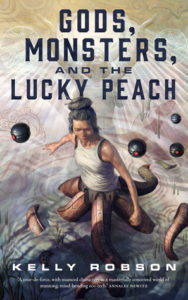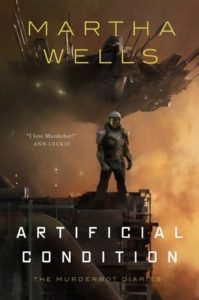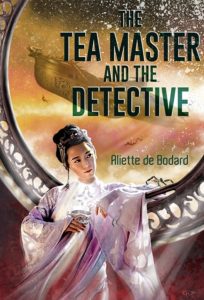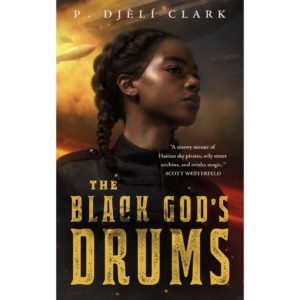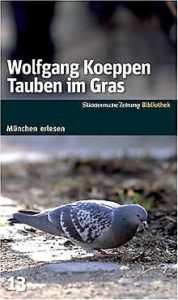For the epigraph to Gods, Monsters, and the Lucky Peach, Robson riffs on the old saying about the past being a foreign country. Instead of “they do things differently there” she has “we want to colonize it.” That’s the first indication that her novella will eventually be a time-travel story. The next is the abrupt shift between a three-paragraph opening scene that features a mythical tone, with a monster that “looked like an old grandmother from the waist up, but it had six long octopus legs,” followed by scenes in a semi-distant future Calgary with “plague babies” who have worked together for more than 60 years, and “fakes” that are something like computer-generated avatars with a generous helping of AI. No wait, the second clue that this is going to be a time-travel story is that after the monster recoils and hisses when the king appears to do battle, it says Oh-shit-shit-shit-shit.
It doesn’t take readers long to learn that Minh, Robson’s main point of view character for the future scenes, has the same number of limbs as the monster that the king Shulgi is battling in those initial three paragraphs. How will their worlds collide? (Presuming, of course, that the number of appendages is not a coincidence.) That’s one of the main throughlines of Gods, Monsters, and the Lucky Peach. Minh’s future world is a bleak one, though from Robson’s descriptions, not as bleak as its recent past. In Minh’s world’s history, total ecological collapse drove humanity to live underground for generations; most people live there still. Minh is one of a relatively small number of people who live in “habs,” attempting to recolonize the surface of the Earth.
In the interim, humanity has developed serious biological modification technology, of which Minh’s extra legs are the story’s most prominent example. During the course of the tale, one of the characters undergoes radical transformation to prove a point; that illustrates how routine this technology has become. And of course there’s time travel, whose workings have been kept hush-hush by the CERN-like agency that developed it. (The agency is even called TERN.) That keeps the traveling sufficiently vague for modern sensibilities but not impossible, because otherwise it would be very difficult indeed to write a time-travel story. I don’t quite buy Robson’s setting — the desertification that she has her characters trying to mitigate would, I think, be impossible to recover from, and ecological catastrophe bad enough to drive the human species underground would also suffice to kill it — but I am willing to roll with it for the sake of the story.

